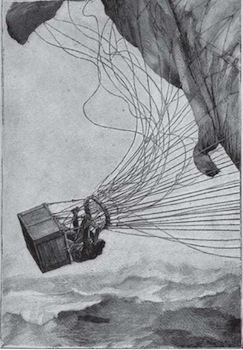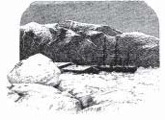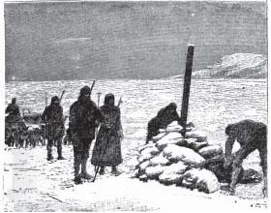Under the Sea to the North Pole (14 page)
Read Under the Sea to the North Pole Online
Authors: Pierre Mael

All was explained. Powerful magnetic currents, due probably to the earth’s rotation, rendered the higher zones of the atmosphere inaccessible. The direction of the icy breezes towards the equator, as recognized by men of science, is but the bending back at the glacial belt of the same breezes from the equator. There is every reason to suppose that at this impassable wall the atmosphere is greatly lowered, and the thickness diminished by the centrifugal force. Schnecker, noticing how near the car was to the waves, began to be afraid of a fall.
“We are lost!” he exclaimed.
Hubert was not at all easy.
“There is a chance,” he murmured, “that we may not get out of this zone of rotation. There is nothing to show that we are not circling round the 88th parallel northward of America, Kamtschatka, Siberia, Russia and Sweden.”
The fear was well founded. It was evident that the balloon, carried round in a movement tangential to the circumference of the enormous glacier, would turn with the earth around the ideal axis which ends at the Pole unless some magnetic current broke in to interrupt the rotation.
And that was what happened.
Suddenly there was a shock, the aerostat dropped literally to the liquid surface, and the aeronauts had to cling to the ropes of the car to prevent themselves from being hurled into the waves. For three or four minutes the balloon sped along at a terrific rate, driven from the wall of ice by some invisible force. And just as suddenly it rose again, attained the same altitude as before, and floated off towards its point of departure.
At the same time the atmosphere became saturated with peculiarly alarming vapours, as if some latent conflagration had disengaged a prodigious quantity of carbonic acid. Schnecker was the first to show symptoms of asphyxia. D’Ermont, perceiving at a distance the camp of the expedition, opened the valve and then exhausted fell back into the car.
There the young officer’s narrative ended.
After this discouraging adventure the majority advised -a retreat. “The Pole is inaccessible,” said the pessimists.
De Keralio protested with all his energy against this want of resolution.

“Gentlemen!” he exclaimed, “never was there a better chance for us. Messrs. D’Ermont and Schnecker have just told us the result of their voyage. It seems proved that the ice cap of the Pole cannot be passed in a balloon. But have we no other means? This submarine boat we have been using as a car can now be put to its proper uses. It can become a submarine boat, and if we cannot get over the ice cap we can go under it.” A long shudder ran through the party, but except Hubert and two sailors no one showed sufficient resolution to dare such a terrible risk. The matter was put to the vote. Sixteen against four decided to return to Courbet Island. De Keralio said not another word, but it was easy to see that he had not so easily given in to what he considered a weakness. But nothing betrayed the extraordinary resolve he had taken. They had reached the last days of June; the sea became clearer and clearer and the explorers had the satisfaction of betaking themselves oftener and oftener to the boats. During the night before the morning fixed for the departure, a storm of snow and rain kept everyone under the tents. When they went out they saw with astonishment that the submarine boat and the reserve of hydrogen tubes had disappeared. At the same time De Keralio and the sailors Riez and Le Clerc, who had voted with him in favour of further advance, failed to answer to their names. In the tent they occupied was found the following letter written hurriedly in pencil:—
“Do not be uneasy with regard to us. I have taken away Le’Clerc and Riez in the submarine boat. I shall only try what is humanly possible.—
DE KERALIO.”
There could be no thought of pursuit. They were free to do as they pleased, and De Keralio was the acknowledged head of the expedition. A meeting was, however, held and it was resolved that nothing could be done without first consulting Captain Lacrosse.
And so the retreat was continued until Courbet Island was reached.
Such was the story Hubert told Isabelle. She was in great distress and did not say a word. She went away, burst into tears in her cabin, and remained there several hours. When she reappeared before her cousin and the captain, who were already discussing what, to do, her face was calm, her attitude resolved.
“What have you decided, gentlemen?” she asked. Lacrosse bowed and replied gently,—
“Nothing as yet. We waited to hear what you said.” Isabelle sat down before the two men, and in a clear voice said,—
“You do not imagine that I am going to abandon my father?”
The captain with a shade of reproach in his tone remarked,.—
“No one here has an intention of abandoning him,” Isabelle held out her two hands to the two men. “I never feared that, captain,” she said, “and my words had not that signification, I assure you. I intended to say that every law, human and divine, lays on you the duty to take back the crew under your charge, while I remain here until I find my father.”
“It was because we foresaw this proof of filial feeling, that Hubert and I have decided to help you at all hazards, and we have thought of a plan which may satisfy the exigencies of your own heart as well as the interest of all.”
“Ah!” said Isabelle. “And what, pray, maybe this solution?”
“This. As captain of the
Polar Star,
I am responsible for all the lives under my command. I propose to return to Cape Washington with the majority of the party. The wooden house is ready for them to pass the winter there as comfortably as we passed the last at Cape Ritter. The state of the sea allows not only of this return, but of a further advance to the northward. We can build with the materials we can bring on board a second wintering-house either here, or on the lands of the 86th parallel, which our companions have reached; and whether you remain at Cape Washington or prefer to remain here, Lieutenant D’Ermont and I, either in the
Polar Star
or her boats, will, up to the last hour of September, continue to explore the channels of the palaeocrystic sea. If the sea is closed we can try the land, or rather the ice. It is impossible, in the two months that remain, for us to miss finding your father.”
Isabelle arose. Tears were in her eyes as she clasped the hands of her two brave companions. “Come!” said she. “It is wisdom that speaks in you captain. Do not hesitate; do not lose a second. Take back to Cape Washington all that is indispensable, and then return to form our second camp. Is it necessary for me to say that I will follow you throughout?” Bernard Lacrosse did not add a word to this declaration. Mounting to the deck, he gave his orders according to the plan agreed upon. The
Polar Star
was off to the south. Never before had an expedition obtained such results. In less than two months of summer, the French had surveyed the northeast coast of Greenland, had discovered an island under the 85th parallel, and found land under the 86th. Yet more; two of them in an adventurous voyage through the air had reached the 88th degree, and discovered the existence of a huge polar ice cap, up to then an unverified hypothesis. They were now entering into winter quarters, but a handful of them were about to continue their investigations. This time they were not acting solely in the interests of science. They were led by the lively affection inspired in them by the generous and imprudent man who had organized the campaign, and whose only fault had been that he would not retreat from the threshold of the last door. De Keralio must be saved from the consequences of his intrepidity, a horrible death from cold and hunger. The season continued fine and wonderfully favourable; and the
Polar Star
took but three days to run the thirty-six leagues between Courbet Island and Cape Washington. In seven days she was back at Courbet Island, bringing the needful material for a second house, and eight men who had agreed to remain on some spot yet to be determined. Captain Lacrosse kept but ten men with him. Twelve others remained at Cape Washington under Lieutenant Remois. On the 5th of August, when Isabelle, whom Tina Le Floc’h would not leave, set foot for the second time on the island, Hubert said with emotion,—
“It is only to-day that we really begin our campaign.”
Next day, when the
Polar Star
attempted to leave Long Creek, the channel was closed by the ice.
Nature herself had fixed the winter quarters of the explorers.

CHAPTER IX
A STRONG WOMAN.

T
HE real campaign was beginning, as Hubert had said. To begin with, an inventory was made of the stores in hand. As a means of security the
Polar Star
was warped into a gap in the cliffs, which served as a better shelter than she had at Fort Esperance. She was surrounded by the steel cradle which had already done such good service. As in the preceding winter, the upper masts and spars were all stowed away, and the deck was covered with a canvas roof to keep off the snow and the wet. The house was not so well placed as that at Cape Ritter, but in order that it might be in constant communication with’ the steamer, a corridor of planks was built connecting the two. It was arranged that should the cold become very intense, the crew would resume possession of the cabins, which it was not intended to abandon altogether.
Provisions were still abundant after due allowance had been made for the goods that had been damaged. There were hopes that the store of fresh meat could be increased; and an understanding was come to with those who remained at Cape Washington, that early in October they would send on provisions to the camp at Courbet Island, if, as seemed probable, game were more abundant on the continent.
With regard to stores, and among the stores were included the valuable resources due to Marc D’Ermont’s discovery, as well as the arms and powder and explosives, on this head there was no anxiety. The quantity of liquid hydrogen shipped on the
Polar Star
was twenty cubic metres, represented by 8000 tubes, forming a considerable portion of the cargo. In Hubert’s strong box there had been about a hundred for experimental purposes. In filling the balloon about 2500 cubic metres of the precious gas had been used, exhausting 400 tubes, containing a thousand litres of the liquefied gas. De Keralio had taken with him 600 tubes, considerably more than enough to work the submarine boat; and the remaining 6500 tubes had been divided between the two camps, giving 3250 tubes, or over eight cubic metres for each.
The laboratory was prepared for the production of oxygen, by means of the decomposition of water, and also of nitrogen, in case they decided to repeat the conclusive experiment of the past winter.
But as Isabelle remarked, what were to be the preparations for the members of the expedition who were going in search of the boat party?
The winter did not delay in announcing its return. Already the days were drawing in with alarming rapidity. It was advisable, therefore, to be prompt if it was desired to take advantage of the last of the mild weather, for every day the thermometer went lower, and on the 6th of August there were eight degrees of cold.
Isabelle betrayed a feverish impatience that was easily intelligible. But as soon as the start had been fixed for the 7th she resumed her usual tranquility, and, by her energy and a sort of fictitious gaiety, gave to the preparations a methodical regularity which encouraged not only good order but a good healthy feeling among the members of the party.
